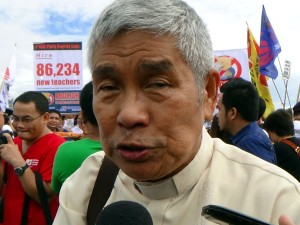SAN PEDRO, Laguna—In the end, the activist priest who had wanted a “poor man’s burial” was brought by his brother priests to his final resting place—a garden in the Our Lady of the Pillar Parish in Imus City, after a funeral Mass concelebrated by a bishop and 60 members of the clergy Monday.
In death, Fr. Jose “Joe” Dizon, who had championed the rights of workers and the oppressed, became the subject of tributes heaped on him by some of the most powerful people in the country, among them Vice President Jejomar Binay, Education Secretary Armin Luistro, Cavite Gov. Juanito Victor Remulla, Sen. Ramon Revilla Jr. and Manila Archbishop Luis Antonio Cardinal Tagle.
Dizon, 65, died on Nov. 4 due to complications from diabetes shortly after celebrating his 40th year as a priest.
“He was sometimes misunderstood. (As) a priest (who was) active and vocal, he was even branded a communist,” said Imus Bishop Reynaldo Evangelista at the Mass. “(But) the truth is he had a deep sense of solicitude and that was his vocation.”
“The ministry of Father Dizon consisted of a profound immersion and solidarity with the poorest of the poor (malalim na pagmamalasakit sa mga mahihirap),” said Evangelista, the main celebrant of the Mass concelebrated with 60 members of the clergy and religious at the Imus Cathedral.
On Monday, around 100 priests from the Imus diocese and from as far away as Cebu City joined Dizon’s family, colleagues and ordinary folk in what Evangelista described as “very solemn” rites.
The Imus bishop had asked the Dizon family to have the priest laid to rest in the cathedral compound.
He said Dizon had wished to be accorded a poor man’s burial, but the diocese deemed it fit to recognize him for his long years of service to the Imus diocese as a priest and minister.
Reached by phone after the funeral, Evangelista said he first came to know about Dizon from newspaper reports, until they personally met when the bishop was assigned to Cavite in June. “I talked to him and visited the Workers Assistance Center (WAC) several times. He did help a lot of people and deeply cared for them,” Evangelista said.
Dizon had actively fought the Marcos dictatorship. His advocacy continued over the decades despite his deteriorating health and extended to recent campaigns against the pork barrel and corruption in government.
“I just wish for someone among those he had organized to continue what (he) started,” Evangelista said.
The son of a laundrywoman and a carpenter from Caloocan City, Dizon was the caring uncle to his siblings’ children, according to his niece, Malou Noda.
Dizon was sweet to his nephews and nieces, she said. “Every Christmas, he would play Santa Claus with his big sack of gifts.”
Noda said the family knew Dizon was an activist, “but never realized the immensity of his work until (people) offered him tributes.”
Dizon’s family carried his portrait during the funeral Mass, but had to leave immediately after to attend to another death in the family.
Dizon’s older brother, Francisco, 72, died early Monday morning, Noda said.
WAC, a group that Dizon founded in 1995, offered the priest a two-day tribute in its office in Rosario, Cavite.
Binay came to Dizon’s wake on Nov. 7, while Luistro came later that night.
Remulla and Revilla came to pay their respects on Nov. 9 when Dizon’s remains were brought to Imus Cathedral. Tagle came to the wake on Sunday.—With a report from Romulo O. Ponte, Inquirer Southern Luzon
